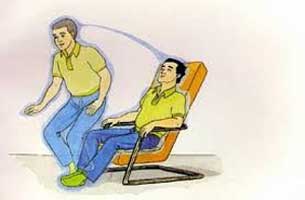- Home
- Editorial
- News
- Practice Guidelines
- Anesthesiology Guidelines
- Cancer Guidelines
- Cardiac Sciences Guidelines
- Critical Care Guidelines
- Dentistry Guidelines
- Dermatology Guidelines
- Diabetes and Endo Guidelines
- Diagnostics Guidelines
- ENT Guidelines
- Featured Practice Guidelines
- Gastroenterology Guidelines
- Geriatrics Guidelines
- Medicine Guidelines
- Nephrology Guidelines
- Neurosciences Guidelines
- Obs and Gynae Guidelines
- Ophthalmology Guidelines
- Orthopaedics Guidelines
- Paediatrics Guidelines
- Psychiatry Guidelines
- Pulmonology Guidelines
- Radiology Guidelines
- Surgery Guidelines
- Urology Guidelines
Sudden drop in Blood Pressure on standing linked to stroke later

According to a new study, middle-aged people who experience a sudden drop in blood pressure called orthostatic hypotension drop may have a greater risk of developing dementia or stroke decades later. The study has been published in the journal, Neurology.
Andreea Rawlings and associates conducted the study in which they defined Orthostatic hypotension as a drop of at least 20 millimeters of mercury (mmHg) in systolic blood pressure, or at least 10 mmHg in diastolic blood pressure.
"Orthostatic hypotension has been linked to heart disease, fainting and falls, so we wanted to conduct a large study to determine if this form of low blood pressure was also linked to problems in the brain, specifically dementia," said study author Andreea Rawlings Bloomberg School of Public Health in Baltimore, Md., PhD, MS, of Johns Hopkins Bloomberg School of Public Health in Baltimore, Md.
The researchers involved 11,709 people with an average age of 54 in the study and followed them forverage of 25 years. All participants met with researchers up to five times over the course of the study. None had a history of heart disease or stroke at the beginning of the study.
In the study, all participants were screened for orthostatic hypotension and they were instructed to lie down for 20 minutes and then stand up in a smooth, swift motion. Researchers took Blood pressure five times upon standing and determined average of the readings and then calculated the difference from the participant's average resting blood pressure. They determined that 552 participants, or 4.7 per cent, had orthostatic hypotension at the start of the study.
All the participants were monitored throughout the study for dementia and stroke with study visits and by reviewing medical records. In all 1,068 people developed dementia and 842 people had an ischemic stroke during the study.
It was found that those who had orthostatic hypotension at the beginning of the study had a 54 per cent higher risk of developing dementia than those who did not have orthostatic hypotension at the beginning of the study. A total of 999 of the 11,156 without orthostatic hypotension, or 9 per cent, developed dementia, compared to 69 of the 552 people with orthostatic hypotension, or 12.5 per cent.
Moreover, those with orthostatic hypotension had twice the risk of ischemic stroke. A total of 15.2 per cent, or 84 of 552 people, with orthostatic hypotension, had an ischemic stroke, compared to 6.8 per cent, or 758 of 11,157 people without orthostatic hypotension. There was no association with bleeding strokes.
"Measuring orthostatic hypotension in middle-age may be a new way to identify people who need to be carefully monitored for dementia or stroke," said Rawlings. "More studies are needed to clarify what may be causing these links as well as to investigate possible prevention strategies."
For more information log on to https://doi.org/10.1212/WNL.0000000000006027

Disclaimer: This site is primarily intended for healthcare professionals. Any content/information on this website does not replace the advice of medical and/or health professionals and should not be construed as medical/diagnostic advice/endorsement or prescription. Use of this site is subject to our terms of use, privacy policy, advertisement policy. © 2020 Minerva Medical Treatment Pvt Ltd